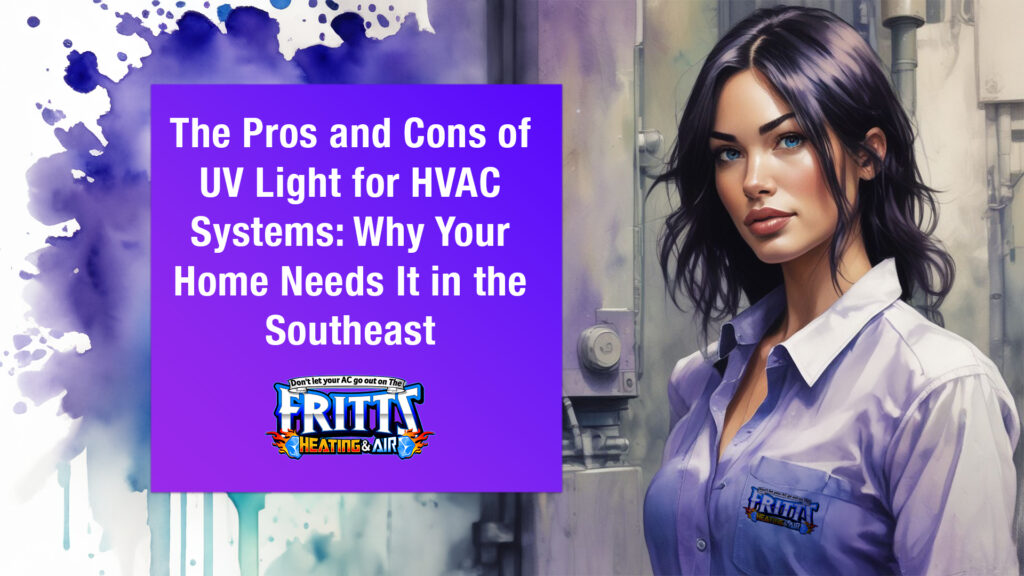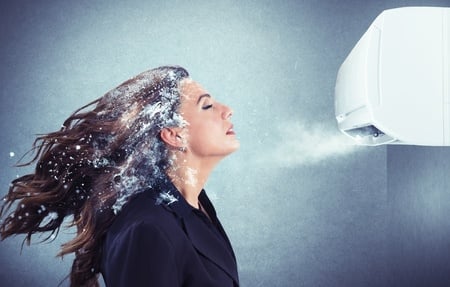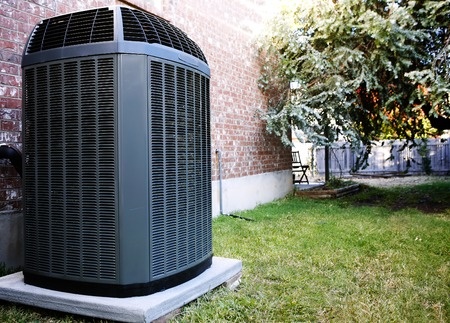
At Fritts Heating & Air, proudly serving Cherokee County and the North Atlanta suburbs, we’re always exploring cutting-edge, practical solutions to help your family breathe cleaner air, save on utility costs, and protect your HVAC investment. One standout technology we highly recommend is the installation of UV lights in HVAC systems. These small but powerful devices harness ultraviolet (UV-C) light to eliminate bacteria, mold spores, viruses, and other harmful microorganisms that often accumulate in HVAC systems.
In the Southeastern U.S., and especially in Georgia’s humid climate, indoor air quality can be a major concern. With long, hot summers and mild, pollen-heavy winters, HVAC systems in areas like Canton, Woodstock, Holly Springs, Ball Ground, and the greater North Atlanta suburbs are in near-constant operation. That means more opportunities for microbial growth inside your system — and a greater need for air purification solutions.
But as with any home upgrade, it’s essential to weigh the pros and cons. In this blog post, we’ll walk you through the advantages and potential drawbacks of UV light installation for HVAC systems — with a strong lean toward why this investment can pay off big time for Georgia homeowners.
The Pros of UV Light for HVAC Systems
1. Improved Indoor Air Quality
One of the top benefits of UV light is its ability to neutralize airborne threats like mold, mildew, viruses, and bacteria. UV light is particularly effective when installed near your system’s evaporator coils or inside ductwork, where dark, damp conditions often promote microbial growth.
Factoid: UV-C light has been proven to kill up to 99.9% of airborne and surface pathogens within HVAC systems, according to the ASHRAE Journal.
This is crucial for families with:
- Individuals with allergies, asthma, or chronic respiratory conditions
- Elderly relatives and young children
- Pets that shed dander or carry outdoor contaminants
In places like North Georgia, where pollen seasons are prolonged and mold growth is common due to humidity, this extra layer of protection can make a noticeable difference in your indoor air quality.
2. Increased HVAC Efficiency
A dirty evaporator coil slows airflow, forcing your system to work harder and use more energy. UV lights inhibit biological buildup, keeping coils clean and your system running at peak performance.
Did You Know? Properly installed UV systems can enhance HVAC airflow by up to 30% and reduce energy consumption by 10–25%, according to data from the Environmental Protection Agency (EPA).
For homeowners in Cherokee County and nearby communities, that can translate into lower utility bills during peak summer cooling months — and reduced strain on your system year-round.
3. Odor Elimination
Have you ever noticed a musty or stale odor coming from your vents? This often stems from microbial growth inside your system. UV lights help neutralize these odor-causing organisms, improving overall air freshness.
Say goodbye to “dirty sock syndrome” — a common HVAC complaint caused by mold and bacteria growing on moist coils.
In humid zones like Canton and Woodstock, particularly during the transitional spring and fall months, UV lights are a great way to keep your air smelling clean and fresh without relying on chemical air fresheners.
4. Longer System Lifespan
Cleaner HVAC components experience less friction, wear, and breakdown over time. UV lights protect vital parts like the evaporator coil and blower motor, meaning fewer service calls and a longer-lasting system.
This is a smart investment in areas like North Atlanta, where HVAC units run nearly year-round and experience heavy seasonal demand.
5. Low Maintenance, High Impact
UV lights are a set-it-and-forget-it solution. Once installed by Fritts Heating & Air, they require only an annual bulb replacement to remain effective — something we’ll take care of as part of your regular maintenance package.
For homeowners in Georgia, this hands-off approach means better air quality without extra work or upkeep.
The Cons (And Why They’re Easy to Manage)
1. Upfront Cost
While there is an initial investment, the long-term savings on energy, repairs, and medical bills from reduced allergens can offset the cost.
Fritts Tip: Ask us about seasonal specials or bundling UV lights with your next HVAC system installation.
2. Annual Bulb Replacement
UV bulbs lose effectiveness over time and typically need to be replaced every 12 months.
Fortunately, we include UV light inspections and bulb replacements in our preventative maintenance service plans, so you never have to remember it yourself.
3. Not a Standalone Air Purifier
UV lights target germs and mold but don’t filter out dust, pollen, or larger particulates. They work best when paired with HEPA filters, routine duct cleaning, and smart humidity control.
Our team can help create a multi-layered air quality plan tailored to homes in the Southeast’s high-pollen, high-humidity zones, like North Georgia and metro Atlanta.
Why Trust Fritts Heating & Air for Your UV Light Needs?
Locally Owned & Operated – We understand the unique HVAC challenges in Cherokee County because we live here too.
Custom Indoor Air Quality Plans – We tailor every solution to your system’s layout and your family’s needs.
Expert Installation & Support – Our certified techs install UV lights quickly and correctly — and we’re always a phone call away.
Upfront Pricing & Affordable Packages – No surprises, no gimmicks.
Trusted by Homeowners Across the North Atlanta Suburbs – From Canton to Holly Springs and beyond, our reputation speaks for itself.
We install industry-leading UV systems compatible with traditional furnaces, central AC, and even mini-split setups.
Ready to Make Your North Georgia Home Healthier?
Cleaner air. Greater efficiency. Longer system life. With minimal maintenance and powerful benefits, UV light for your HVAC system is one of the best decisions you can make for your home comfort and health.
Call Fritts Heating & Air today at your phone number] or schedule your in-home estimate online. Let us help you breathe easier — all year long in Cherokee County and the greater North Atlanta suburbs.


